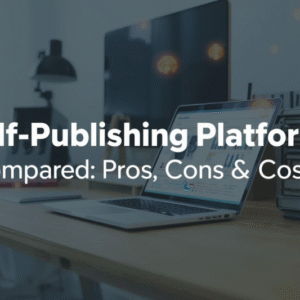Marketing your self-published books can feel overwhelming. There are many techniques and platforms available, and it isn’t always clear which approach might work best for your unique writing style and genre. However, a solid plan that focuses on your audience and makes the most of online platforms can help you build a loyal readership.
Self-publishing means you have control over every aspect of your book, from writing to design. With that independence comes the responsibility to market it effectively. In this guide, I share insights, tried and tested strategies, and clear steps to help you promote your work. These steps can turn marketing from an intimidating task into a series of manageable actions tailored to your needs.
Turn Your Passion into Earnings
Get the Tools, Training and Support you need. All in One Place
Join a a Vibrant and Global Community of
Marketers and Entrepreneurs from Around the World
Step 1: Define Your Target Audience
The first step in marketing your self-published books is to really understand who your readers are. Knowing what your audience loves and expects from a story will help you craft messages that resonate. It also helps in selecting the right platforms to reach them. Taking time to check out the interests, habits, and challenges of your ideal readers provides you with a solid roadmap for your promotional efforts. Spending time on this step not only clarifies your approach but also gives you confidence once you start engaging with potential fans.
Questions to Explore:
- What genres or themes attract your ideal readers?
- Where do they usually spend their time online?
- What are their favorite authors, books, or blogs?
- What challenges or needs can your book address for them?
Example Audience Profiles:
- Fans of fantasy might be drawn to detailed world-building and epic adventures.
- Mystery lovers may appreciate clever plot twists and engaging characters.
- Romance readers might be interested in character dynamics and emotional storytelling.
Answering these questions gives you a roadmap. Once you tailor your marketing message for a specific audience, you can better connect with potential readers and build a community that truly appreciates your work. Taking the time to study your audience not only strengthens your promotional plan but also empowers you to adjust your tactics when needed.
Step 2: Build Your Online Presence
Having a strong and professional online presence is key to attracting readers and building credibility. Most readers search for online information when they want to learn more about an author or a book. Creating a website and using email marketing can really boost your visibility. Carefully crafting your online profile helps foster trust, and it gives readers a clear invitation to learn more about both your book and the creative mind behind it.
Elements of a Strong Online Presence:
- Author Website: A simple, clean website where you showcase your books, share your biography, and even maintain a blog can work wonders. Make sure your website is easy to navigate and visually appealing.
- Email List Building: Offer a free excerpt or a bonus short story in exchange for email sign-ups. This list gives you a direct line to your readers and can help promote new releases.
- Blogging: Writing about topics related to your book’s genre or your writing process can help drive traffic, improve SEO, and position you as an expert in your field.
Starting with a small website and gradually expanding as you build content and email subscribers is more manageable than trying to do everything at once. A professional online platform builds trust and invites readers to not only check out your published works but also explore the stories behind your creative journey.
Step 3: Take Advantage of Social Media for Book Promotion
Social media platforms provide excellent opportunities to interact with readers, share details about your writing process, and promote your books. Selecting platforms that best match your target audience is essential. It’s better to be strong on a couple of platforms than to spread yourself too thin across many outlets. By using social media as a tool, you allow your personality and passion for writing to shine through, which in turn draws readers in.
Social Media Strategies to Consider:
- Regular Updates: Post about your writing progress, behind-the-scenes insights, or snippets from your upcoming projects.
- Engaging Content: Use interactive posts such as polls, Q&A sessions, or short video clips. These can create conversation and interest around your books.
- Community Engagement: Join groups, follow hashtags related to your genre, and participate in discussions. Building genuine relationships online can lead to increased recognition for your books.
Platforms to Explore:
- Twitter: Great for interacting with readers and other authors in real time.
- Instagram: Ideal for sharing visuals including book cover art, creative flat lays, and lifestyle images related to themes in your books.
- Facebook: Useful for hosting dedicated book pages or groups where readers can discuss your work.
Remember to schedule your posts at regular intervals and use a social media calendar to ensure you consistently engage with your audience, even when busy with your writing assignments. A routine approach to social media marketing helps in keeping your fans updated and excited about your upcoming releases and projects.

Step 4: Employ Content Marketing Strategies
Creating valuable content related to your books can attract and retain readers. Content marketing goes beyond simply promoting your book; it involves providing information or entertainment that appeals to your target audience and establishes you as a knowledgeable author in your niche. By offering useful and engaging content, you invite readers to spend more time exploring your work.
Content Ideas for Authors:
- Blog Posts: Share posts that discuss your inspiration, writing tips, or background research. These posts can offer insights that inspire your readers and attract new audiences via search engines.
- Podcasts and Interviews: Participate in or host podcasts where you talk about your writing journey and the themes of your work. Audio content appeals to those who enjoy listening during commutes or while multitasking.
- Newsletters: A monthly or bi-weekly newsletter filled with updates on upcoming releases, writing advice, and special offers can nurture a loyal readership base.
- Guest Posts: Writing for other blogs or websites lets you tap into new audiences. These platforms may feature reviews or interviews about your work as well.
Consistent content production can help build an audience over time. The more valuable content you offer, the more likely readers will see you as a reliable resource and continue to follow your work. Focusing on quality and relevance puts you in a strong position to keep your readers engaged and eager for more insights.
Step 5: Network and Collaborate with Other Authors
Collaboration plays an important role in reaching a wider audience. Networking with fellow authors, bloggers, and book reviewers creates pathways for mutual promotion. Sometimes a simple shout-out or guest blog post can lead to significant interest in your books. Building a network not only creates opportunities for collaboration but also opens up avenues for learning and shared growth.
Ways to Build Your Network:
- Join Writing Communities: Online forums, social media groups, and local writer’s clubs connect you with like-minded writers and potential readers.
- Collaborative Projects: Co-writing stories, participating in anthologies, and hosting joint webinars are great ways to expand your reach.
- Book Reviews: Encourage book bloggers and reviewers to read your work. Their reviews can amplify your reach to audiences who trust their opinions.
- Virtual Book Tours: These tours involve a series of blog posts, interviews, and features on different websites that together promote your new release.
Building a professional network helps you share available resources and learn new marketing tactics from author communities. These relationships often lead to collaborations that benefit everyone involved, increasing exposure in ways that you might not accomplish on your own. Taking the time to nurture these connections can really open up unexpected opportunities for growth and innovation.
Common Questions & Troubleshooting
What if my promotional efforts don’t yield immediate results?
Marketing is often a gradual process. It might take time for your efforts to compound and create a noticeable audience boost. Keeping track of metrics and adjusting your strategies based on what resonates with your readers helps turn initial challenges into long-term opportunities. Patience and persistence are very important as you refine your approach with each campaign.
How can I balance writing and marketing?
- Set specific time blocks for marketing activities and stick to them. Even just one or two structured sessions a week can build momentum over time.
- Consider outsourcing tasks such as social media management or website design if your budget allows.
- Plan your marketing steps in advance, so you know exactly what to do on days when creativity is focused on writing.
What if I don’t know enough about SEO?
- Start with the basics by learning about keywords and optimizing your website content.
- Use free tools and guides available online to gradually improve your search engine presence.
- Partner with someone who has SEO experience if you find it challenging to manage on your own.
Answering these common questions can guide you when issues arise. Marketing isn’t one-size-fits-all, so experimenting and refining your approach is key to turning setbacks into setups for future success.
Looking for a training platform that actually works?
I’ve put together a full walkthrough of the affiliate marketing training that helped me build everything I have today. It’s practical, beginner-friendly, and you can try it out for free to see if it suits you.
Take a look at my honest review and see if it’s the right fit for you.
Final Thoughts & Next Steps
Promoting your self-published books involves consistent effort across several fronts. By understanding your audience, establishing a solid online presence, taking advantage of social media, creating valuable content, and networking with other authors, you equip yourself with a robust marketing framework. Every step you take builds a stronger connection with your readers and lays the groundwork for future success.
Your Action Plan:
- Spend a few days researching who your readers are and note down their preferences.
- Create or update your author website and start building your email list—even a small number of subscribers matters.
- Pick one or two social media platforms where your target audience spends time, and create a consistent posting schedule.
- Produce content such as blog posts or participate in interviews that share insights into your writing adventure and engage potential readers.
- Reach out to fellow authors and collaborators to discuss joint projects or guest posts.
Remember that every marketing effort contributes to building your personal brand as an author. Even if results seem slow at first, every interaction increases your visibility and builds the foundation for future success. Keep experimenting, tracking results, and adapting as needed to refine your approach. Marketing doesn’t have a fixed formula; it’s an ongoing conversation between you and your readers. Continued effort in these steps can lead to a vibrant community eager to follow your next project. What step will you focus on first to boost your book’s reach?
Additional Tips and Resources for Self-Publishing
To further help you on your path, here are a few extra ideas that can add even more value to your marketing strategy. First, consider investing time in learning about digital advertisement platforms. Even a small budget can be used to test campaigns on social media or search engines. This can give you a clearer picture of which content resonates most with your audience. Second, look for online webinars, workshops, or even local meetups where experts share advice on both writing and marketing. Such resources not only provide practical tips but also expose you to a wider community of creatives.
Another valuable approach is to build relationships with local libraries and bookstores, even if they are independent. These partnerships can lead to book readings, signings, or even small press events that put a spotlight on your work. Don’t hesitate to reach out for collaborative events – every conversation is an opportunity to learn and grow. Remember, even simple actions like updating your social profiles regularly or asking your readers for feedback can add up meaningfully over time.
Taking these steps not only helps in smoothing the way for a successful book launch but also sets you up for long-term recognition in the literary world. With passion, persistence, and the willingness to try new ideas, you can continuously level up your marketing game and ensure that your work reaches the audience it deserves.
Let’s make it happen!





